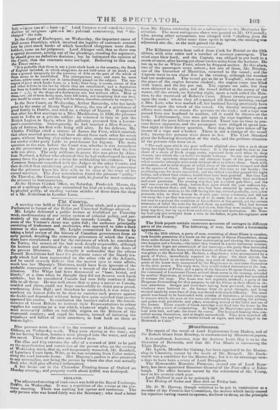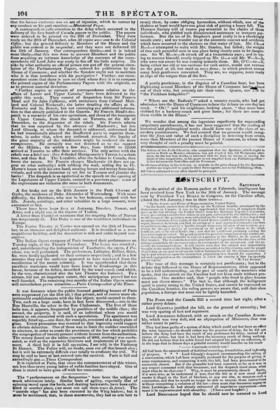Mr. 1). W. Harvey, though solicited to be put in
nomination as a member of the Pension-list Committee, the motive which lately caused his rejection having ceased to operate, declines to dose, on the principle that his former exclusion was an act of injustice, which he cannot by any conduct on his part sanction.—Ministerial Paper. A correspondent calls attention to the delay which occurred in the delivery of the first batch of Canada papers to the public. The papers Were ordered to be printed on the 23d of December. They were ready on the 28th of December, when 50 copies were sent to the Colonial Office ; but the general delivery to Members of the House and the public was ordered to be suspended ; and they were not delivered till the 10th of January. Our correspondent thinks—and it is indeed most likely—that this was done to prevent Members and the public from acquiring an intimate knowledge of the contents of the corre- spondence till Lord John was ready to fire off his little surprise, lie asks by what authority an official person can put off the general circu- lation of the Parliamentary Papers, ordered for publication by the House of Commons ; and whether the Speaker ought not to ascertain who it is that interferes with his prerogative ? Further, our corre- spondent states that there is now no clerk whose duty it is to compare the printed copies of the Parliamentary Papers with the originals, so as to prevent material deviation. "Further copies or extracts of correspondence relative to the affairs of Lower and Upper Canada," have been delivered to the public this week. They consist of despatches from Sir Francis Bead and Sir John Colborne, with enclosures from Colonel Mait- land and Colonel Wetherell; the latter detailing the affairs at St. Eustache and St. Benoit, but not conveying any additional informa- tion to that already published in the Gazette. Sir Francis Head's des. patch is a narrative of his own operations, and those of the insurgents in Upper Canada, from the attack on Toronto, on the 4th of December, to the dispersion of the rebels. Sir Francis admits that he was surprised by the advance of Mackenzie ; but lets Lord Glenelg, to whom the despatch is addressed, understand that be had intentionally allowed the disaffected party to organize them- selves, in order that, when any outbreak occurred, the loyalty of the great majority of the inhabitants might he rendered the more conspicuous. He certainly was not deceived as to the support of the Militia ; for within a few days, from 10,000 to 12,000 arrived at Toronto to offer their services. The only action with the rebels was a brief one : they defended Montgomerie's Tavern fora short time, and then fled. The Loyalists, after the fashion in Canada, then burnt the tavern. Sir Francis charges Mackenzie (it does not ap- pear on what authority) with robbing the mail, setting fire to Dr. Home's house with his own hand, stealing horses and money from indi- viduals, and with the intention to set fire to Toronto and plunder the banks ! The despatch is as egotistical as the speech on the opening of the Legislature of Upper Canada, noticed in a previous page : some of the expressions are verbatim the same in both documents.



























 Previous page
Previous page